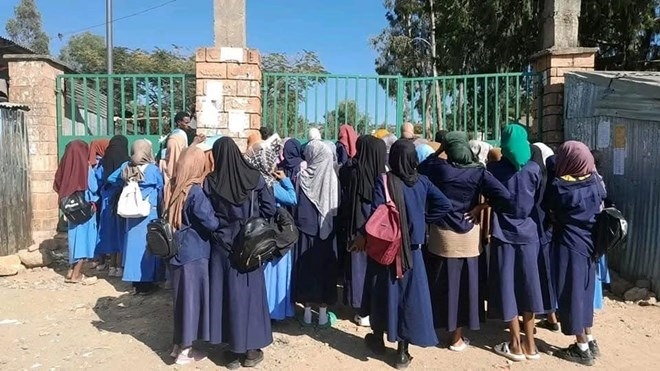Facebook Twitter (X) Instagram Somali Magazine - People's Magazine
A controversial school directive in Axum, Ethiopia, banning Muslim girls from wearing hijabs in classrooms has led to the expulsion of over 159 students, igniting widespread condemnation and concerns over religious freedom violations. The ban, which has disproportionately affected Muslim students, has been denounced by both religious leaders and human rights advocates, emphasizing its impact on educational equality and national unity.
The Supreme Islamic Council of Tigray has strongly criticized the directive, calling it discriminatory and unconstitutional. In a public statement, the council expressed deep concerns about the ban, stating that it undermines Ethiopia’s longstanding tradition of religious tolerance. The council highlighted cases where Muslim students were reportedly harassed and detained for adhering to their faith, urging immediate government intervention to reverse the policy.
Among those affected is a 12th-grade student from Axum High School who shared her personal ordeal, describing how the ban has disrupted her education and future aspirations. “While my classmates continue their education, I’m stuck at home. This ban has shattered my dreams,” she said, choosing to remain anonymous out of fear of reprisal. Her statement reflects the broader emotional and academic toll the ban has taken on affected students.
Ethiopia’s education sector is already under significant strain, with nearly 9 million children out of school due to conflicts and natural disasters. The hijab ban further exacerbates this crisis, disproportionately impacting Muslim girls and deepening existing educational inequalities. Rights advocates have raised concerns that such policies not only marginalize specific communities but also risk entrenching systemic discrimination within the educational framework.
Human rights groups have joined the call for urgent government intervention, emphasizing the need to protect religious freedoms as enshrined in Ethiopia’s constitution. A prominent human rights advocate remarked, “Policies targeting specific groups threaten national unity and violate fundamental rights. Every child, regardless of their faith, deserves equal access to education without discrimination.”
The ban has sparked a broader debate about religious freedom and inclusivity in Ethiopia, a nation known for its diverse cultural and religious heritage. Many are questioning whether such policies reflect a growing intolerance toward minority groups. The Ethiopian government has yet to release an official response to the mounting criticism, but pressure continues to build for authorities to address the issue and ensure educational access for all students.
The unfolding situation in Axum serves as a critical reminder of the importance of upholding human rights and educational access, especially in multicultural societies. Advocacy groups, local community leaders, and international bodies are closely monitoring the situation, emphasizing the urgent need for policy changes that respect both cultural diversity and fundamental human rights.

